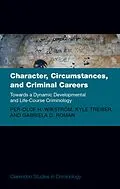Why do young people engage in acts of crime and what is it that drives their criminal careers? These are the key questions addressed in Character, Circumstances, and Criminal Careers which explores and explains people's criminal careers through adolescence into young adulthood. Guided by Situational Action Theory (SAT)'s Developmental Ecological Action (DEA) model, the work analyses longitudinal data from the Peterborough Adolescent and Young Adult Development Study (PADS+), testing various hypotheses about the causes and drivers of people's crime involvement and criminal careers. Character, Circumstances, and Criminal Careers makes an argument for a more dynamic Developmental and Life Course criminology (DLC) by theorising and exploring the relationship between individual characteristics and environmental features and their changes across adolescence and into young adulthood. The book considers whether childhood predictors, such as social disadvantage and social adversity, affect different trajectories of crime involvement. It also presents a special analysis of the age-crime curve and its explanation. The book includes the most recent and updated statement of Situational Action Theory and its DEA model, including comparisons between the basic assumptions and propositions of SAT and selected major criminological theories (social bond and self-control theories, differential association and learning theories, rational choice theory and the theory of moral disengagement). Character, Circumstances and Criminal Careers presents an original theory, a uniquely detailed contemporary longitudinal study, and novel research methods and analytical techniques, and applies these to derive innovative findings about the relationship between individual and environmental factors across a critical developmental period.
Autorentext
Per-Olof H. Wikström (PhD, Docent, Stockholm University) FBA; Professor Emeritus, University of Cambridge; Professor, Malmo University. Wikström's research focuses on the development and empirical testing of an integrative theory of the causes of crime (situational action theory; SAT) and how this can contribute to knowledge-based crime policy and prevention. He has received a number of scientific accolades, including: Northern Scholar at the University of Edinburgh 1992; Sellin-Glueck Award 1994; Fellow at the Centre for Advanced Studies of Behavioural Science, Stanford 2002; Fellow of the American Society of Criminology 2010; Elected to the British Academy 2011; Stockholm Prize in Criminology 2016; Honorary Doctorate UNED 2017; The Beccaria Gold Medal 2024. Kyle Treiber is Associate Professor in Neurocriminology at the University of Cambridge and Co-Director of the Centre for Analytic Criminology (www.cac.crim.cam.ac.uk
